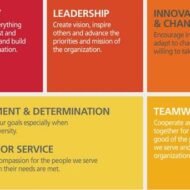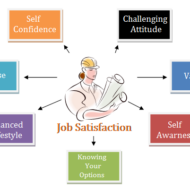Posted by Managementguru in Business Management, Entrepreneurship, Human Resource, Organisational behaviour, Principles of Management, Training & Development
on Mar 30th, 2014 | 0 comments

Values and Beliefs in Organizations What are Values and Beliefs in an Organization: An organisational value is “a belief that a specific mode of conduct is preferable to an opposite or contrary mode of conduct.” Infosys Narayanamoorthy on Value System : Our team was unique in our commitment to a strong value system. We believed in putting the interest of the company ahead of our own interest. We believed in legal and ethical business. A sound value system is what differentiates long-term players from others. Core Values of an Organization: Increasingly, organizations are setting out the core values that they think should govern the behavior of all their employees. Value statements may be produced which define core values in areas such as: Care for customers Concern for people Competitiveness Enterprising Excellence Flexibility Growth as a major objective Innovation Market/customer orientation Productivity Quality Teamwork But, is that all? By just defining what you think is important to guide the action of your employees may not suffice the cause. How do you put them into action! That’s where the secret lies. Imitating the Boss: How do you make people do what you want them to do! Just by being a precedence or role model for your followers, is that not true? The best example that can be cited is the school atmosphere, where the kids take to their teachers. They simply, blindly follow or imitate whatever their masters do. I think IMITATION is the right word, because it makes people easily inclined to the behavior that is appreciated by the organisation’s atmosphere. When you imitate your boss you get a surreal feeling of being a boss at least for that time being. Coercion is not the Right Approach: It is a general fact that it is very difficult to train or mould people the way we want to. And again it can be argued that people can be trained or molded very easily when you have the right kind of motivation and guidance. The core values should be INBUILT; it should be there RIGHT FROM THE START. If you have able managers to run your teams it becomes a cake walk for you to train the individuals without much COERCION. The authority and influence which the team leader has over the team says it all. Influencing the Employees the Right Way: Everybody in an organization plays their own role in cherishing the values imbibed and focus on achieving results, and keenness to “GET GOING AND KEEP GOING”. High work output is expected from a clerical staff, the Supervisor can be depended on for effective organization and control of teams and their work. THE MANAGER is clear about what “success “means for the business and is resourceful in overcoming obstacles. THE SENIOR MANAGER maintains focus on the “BOTTOM LINE” despite continuous changes to procedures and systems, and the EXECUTIVE is focused on results even when dealing with very diverse complex tasks and proactive in tackling mistakes. Performance of Value Oriented Organizations: Value Oriented Organisations perform definitely better than others and achieve their targets in a quick manner. Values give direction to the firm backed up by solid principles to guide the action of the employees and also the commitment and determination to achieve whatever is due. Reliance Industries Limited stands as a testimony for a single man’s dream and vision and his core value was CUSTOMER SATISFACTION. To scale to greater heights, you also need STRONG WILLED PEOPLE RIGHT ATTITUDE ACTION PLANS STRATEGIES PERSISTENCE DETERMINATION and PASSION Values add integrity and honor to your organization and you should always remember that to hold your values you...

Posted by Managementguru in Decision Making, Human Resource, Motivation, Organisational behaviour, Principles of Management
on Mar 19th, 2014 | 0 comments

Are You Happy with Your Job What is your attitude towards Job? How many of us go to work with cheery attitude and positive framework of mind. Most of us treat work as a duty or accountability. Either way it does not solve the purpose. If you treat job as a duty, there can never be any enjoyment attached to it. In case of accountability, you work to reach some targets without any passion for the job or you spend most of your time dreading the thought of reporting to your superior. Without involvement and love, any job is not complete and people experience only “Job Satis-friction“and not satisfaction. Have you thought about it? Scenario in Developing Countries: In most of the developing countries the proportion of dissatisfied group dominates the satisfied set of employees. This is because preference and priority is to earn the daily bread rather than achieving anything big. Well, this attitude shall be attributed to the low income group where without work their lives cannot go on. But the bottom line remains the same, the work should be satisfying. So, what are the terms? Also See: Performance Appraisal High Income Group: In high income group and higher level jobs where the work is very challenging, we see that the employees are very much satisfied with their work. They need constant battles to win over and are provided with such an environment that puts their think tanks into full use. But is it enough to keep them satisfied; no, the reward system has to be equally compensatory. Rewards in terms of pay, perks, recognition, appreciation, social status, awards and what not. So, how do we correlate satisfaction factor with productivity? The organization has to maximize the positive relationship between performance and reward systems. Also See: How to Handle Attrition 30 Simple Ways to Make Your Employees Happier Repetitive and Monotonous Jobs: Repetitive and monotonous jobs make a person dull headed and a stereotype; his enthusiasm is absorbed to the extent that he fails to understand and rejuvenate his skills. The job content should provide at least some sort of cheer and interest to the performing individual. Say for instance, you manufacture plain paper cups, if you decide to incorporate some floral designs on the covers; you very well witness a fresh whiff of enthusiasm amongst your work force. Such is the power of variety and change that brings cheer into human lives and attitude. If you are a terrific boss everybody will like you but if you are a source of terror, chances are there that there is a high turnover ratio in your company. People after all expect certain level of consideration and warmth from their bosses. Organizations must make the individuals perceive their roles properly to affirm satisfaction and to avoid conflicts. Career Advancement: Courtesy – Roscostretch Career advancement is what most of the people aspire and when they don’t find any scope for advancement their interest in the job gradually decreases. Merit versus experience factor also has its say over deciding the next probable candidate for promotion. The top level management, especially the human resource department must ensure the employees with a supportive environment that paves the road for collaborative effort and in turn internal satisfaction. Job Satisfaction: Job satisfaction has to be considered from a broader perspective that encompasses all the independent and dependent variables that affect the nature of a particular job. This is very vital to an organization as job dissatisfaction leads to absenteeism, high turn over or attrition and decline in productivity. A dissatisfied employee is always a pain who can create problems by voicing his protest, gathering the union, neglecting his work or quitting. To avoid friction in the minds of...




